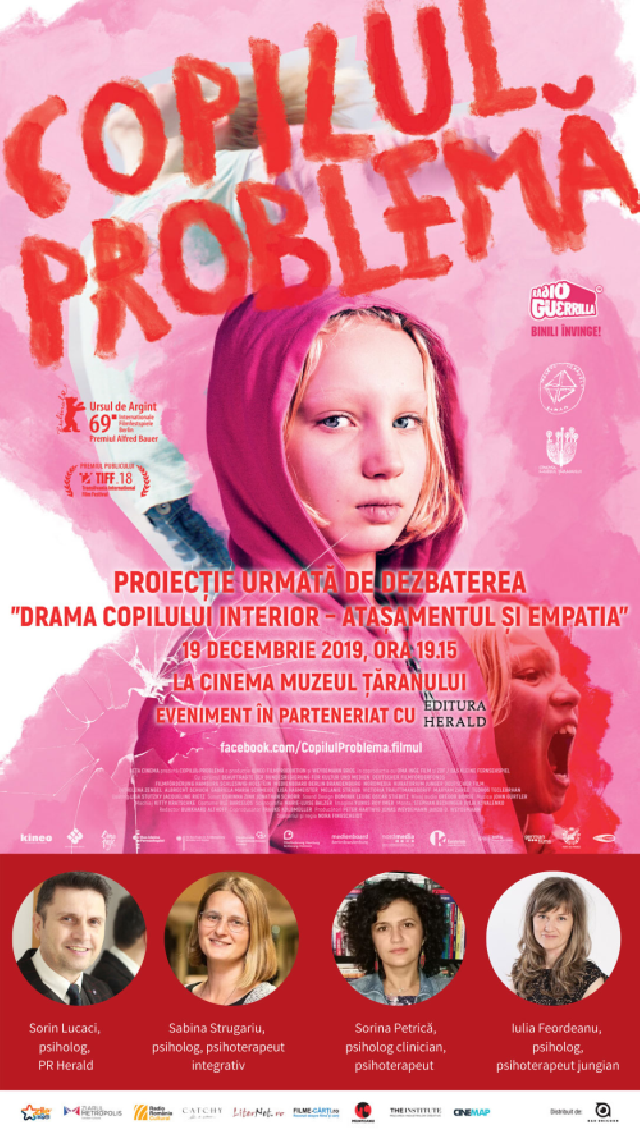The Drama of the Inner Child
'The Drama of the Inner Child – Attachment and Empathy' debate

Monica Chiorpec, 08.01.2020, 14:30
The Drama of the Inner Child — Attachment and Empathy is the topic of the debate held by the Herald publishing house at the screening of the German film System Crasher, at the Peasant Museum Cinema Hall. At nine years of age, Benni is what social workers already call a problem child. She has only one goal: to get home to her mother, while social workers are doing their best to find her a stable place to call home. Unfortunately, such drama is inspired from real life, that of many children in Romania and elsewhere. Here is Sorin Lucaci, PR representative from Herald:
The experts we have picked are invited to share a few basic notions in contemporary psychological and educational theories, which can help us gain better understanding, more empathy and compassion towards our children and their problems, a better communication in the child-parent relationship. This is about emotional wounds, rejection, abandonment, fear, trauma, vulnerability and rebellion, dependence and challenge, connection, attachment, and empathy. We also should discuss the roots of violence in childhood.
Bennis story in the movie System Crasher reflects a cruel reality in the world today. Thousands of children live the drama of abandonment every year, at a very tender age, and most of them suffer emotional wounds that are very difficult to treat, according to psychologist and counselor Iulia Feordeanu:
I had the opportunity to work for five years with child protection offices in Romania. I saw children with behavior similar to Bennis, as well as educators, psychologists, social workers who try for years on end to help these problem children. This is reality, were not talking about fiction. Unfortunately, many children, who eventually become adults, didnt get the benefit of sufficient safety in childhood, and enough understanding of their needs from parents.”
The environment in which a child develops in their first few years of life is very important for their emotional and mental development as they become adults. Unfortunately,child protection systems cannot safeguard the recovery of such children with trauma in these areas, in Romania and in other countries. Here is Iulia Feordeanu:
“Lacking a safe environment and responsible parents, children cannot develop properly. Their emotional balance is seriously affected. Unfortunately, I have to say that most times they dont recover, in spite of the best intentions on the part of adults. I had the opportunity to work on projects for emotional support both in Romania, with children in the system, and other countries, such as Ukraine and Asian countries. Everywhere I went, institutionalized, problem children, abandoned children, abused children, are all the same.”
Experts do everything in their power to reintegrate such children who are victims of repeated abandonment, trying to provide them with what may become for them a family. Unfortunately, the attachment issues they have are there to stay. Here is clinical psychologist Sorina Petrica:
“Healing can only occur in a relationship. The systems of child protection anywhere in the world are an imperfect solution for these children. Most times they are moved from one home to another, and every time they experience breaking off a relationship, they experience abandonment all over again. It is as if they get traumatized with every relationship they gain and then lose.”
Sorina Petrica explains why the treatment and healing of these children is made harder precisely by the adults who are not prepared to approach such a problem correctly:
“Healing is possible only in case these children finally manage, with great effort, to attach themselves to an adult, because they need a constant presence in their lives. The moment this happens, what is needed is not only this constant presence, but it is necessary for these kids to get what they never had before: respect as their own person, not what their parents want them to be. They need understanding, acceptance, and unconditional love. All these things are very hard to come by in the case of abandoned children. Abandonment teaches you cant trust others, that adults are a danger. They develop a series of emotional problems, which are very difficult to manage. They live and experience very intense emotions, and have great difficulties in calming down.”
Sabina Strugariu, an integrative therapist, told us about the need of adults to get in touch with their inner child, in order to be able to deal with institutionalized children:
“Ive always had a big problem with the phrase problem child. I like much more the title System Crasher, because it moves the emphasis elsewhere, since I dont believe that the child is the problem. The children are never the problem in terms of the style of attachment, due to the fact that, when we are children, we copy the style of attachment of our caretaker, the one who helps us develop. These problem children, in the system and in homes, are demonized, we are afraid of them, because their emotions are hard to manage. Often times, this happens because we, as adults, have an inner child that is just as damaged, that we are afraid of. And since we have a hard time taking care of ourselves, we project onto our children what we are unable to do for ourselves.”
By the end of 2018, Romania had about one thousand children abandoned every month at birth in hospitals. They eventually end up with maternal assistants or in placement centers. The adoption process is difficult, and the trauma suffered by these children is sometimes irreversible.






























